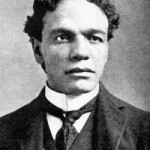 Amid the coverage that focused on the induction of former Notre Dame star Tim Brown to the College Football Hall of Fame, the fact that the list of 24 former players and coaches inducted included former Harvard center William H. Lewis has been almost completely overlooked.
Amid the coverage that focused on the induction of former Notre Dame star Tim Brown to the College Football Hall of Fame, the fact that the list of 24 former players and coaches inducted included former Harvard center William H. Lewis has been almost completely overlooked.
Admittedly, Lewis is not exactly a household name in 2010. His years on the Harvard football team were 1891 and 1892, and he was a lineman. However, the Virginia-born Lewis compiled an impressive list of accomplishments in his career, both as a football player and as a lawyer, which deserve to be better known. For example:
(a) Lewis was the first African-American to play American college football. This happened when he transferred to Amherst College from the all black Virginia Normal and Collegiate Institute (now Virginia State College) at the urging of his mentor, John Mercer Langston, the institution’s president. (Langston was also one of the first half dozen black lawyers in American history and was the first dean of the Howard Law School.) Lewis, who had never before played the game, was a member of the Amherst football team for three years. He not only starred at football, but he was also the commencement speaker when he graduated in 1892.
(b) After graduating from Amherst, Lewis enrolled at the Harvard Law School, from which he graduated in 1895. During his first two years of law school, he also played for the Harvard varsity football team, winning All-American honors each year. He was named captain of the Harvard team late in the 1893 season, making him the first black All-American and the first black to captain a college football team. As a law student, he was also instrumental in convincing the Massachusetts legislature to enact amendments to its civil rights laws to provide additional protections to African-Americans.
(c) In 1900, legendary football coach Walter Camp named Lewis as the best center in the history of college football, crediting the quick-footed 175 pounder with revolutionizing his position.
(d) From 1895 to 1906, Lewis helped coach the Harvard eleven, leading the team to a combined record of 114-15-5. Lewis was widely viewed as an innovative coach, and in 1896, he published one of the first guides to American football, entitled “A Primer of College Football.” The work was serialized in Harper’s Weekly, one of the nation’s best known magazines in that era, and published by the Harper & Brothers publishing house. In 1905, when a serious effort to ban football from college campuses emerged, Lewis was an eloquent defender of the sport and its role in higher education.
(e) While serving as a coach at Harvard, Lewis, a Republican, practiced law in the Boston area. He was also elected to the Cambridge, Massachusetts city council in 1899, and in 1902, he was appointed to fill a vacancy in the Massachusetts state legislature. He was, however, defeated when he ran for re-election in 1903.
(f) In 1903, following his electoral defeat, President Theodore Roosevelt, also a Harvard graduate, appointed Lewis Assistant United States Attorney for the eastern district of Massachusetts. Lewis was the first African-American lawyer to hold such a position.
(g) In 1910, President William Howard Taft appointed Lewis to the position of Assistant United States Attorney General, the highest position in the United States government that had ever been offered to an African-American. Lewis was confirmed by the United States Senate over Southern Democratic opposition in 1911, and became a highly visible figure in the nation’s capital for the remainder of the Taft presidency.
(h) In 1911, Lewis became the first African-American lawyer elected to membership in the American Bar Association. Unfortunately, his election touched off an effort to expel him from the organization on the part of members who claimed that Lewis had misled the admissions committee by failing to list his race on his application. Although Lewis was ultimately permitted to remain a member, in part because of the intervention of United States Attorney General Wickersham who wrote personal letters to each of the 4,700 ABA members, the ABA adopted a new rule in 1912 barring other black lawyers from joining the association. (This rule was not repealed until the 1940’s.)
(i) Lewis left government service in 1913, following the election of Democratic president Woodrow Wilson. He returned to Massachusetts where he successfully practiced law until his death in 1949.
(j) Historians of early football appear to unanimously agree that Lewis’ election to the College Football Hall of Fame in 2009 was woefully overdue. It is also time to secure his place in the pantheon of great African-American lawyers.
 I rather liked Rebecca Blemberg’s post on lawyer happiness and virtue ethics and would like to extend the discussion. I agree that one of the mistakes a lawyer can make is to follow the lure of a consequentialism that is divorced from her knowledge of herself and what that tells her about the way in which she should practice law.
I rather liked Rebecca Blemberg’s post on lawyer happiness and virtue ethics and would like to extend the discussion. I agree that one of the mistakes a lawyer can make is to follow the lure of a consequentialism that is divorced from her knowledge of herself and what that tells her about the way in which she should practice law.
